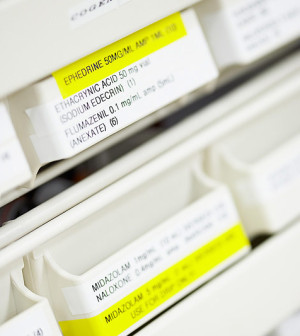- Double Mastectomy May Offer No Survival Benefit to Women With Breast Cancer
- Toxic Lead Found in Cinnamon Product, FDA Says
- Certain Abbott Blood Sugar Monitors May Give Incorrect Readings
- Athletes Can Expect High Ozone, Pollen Counts for Paris Olympics
- Fake Oxycontin Pills Widespread and Potentially Deadly: Report
- Shingles Vaccine Could Lower Dementia Risk
- Your Odds for Accidental Gun Death Rise Greatly in Certain States
- Kids From Poorer Families Less Likely to Survive Cancer
- Tough Workouts Won’t Trigger Cardiac Arrest in Folks With Long QT Syndrome
- At-Home Colon Cancer Test Can Save Lives
Adempas Approved to Treat Pulmonary Hypertension


WEDNESDAY, Oct. 9Adempas (riociguat) has been approved by the U.S. Food and Drug Administration to treat two types of pulmonary hypertension, characterized by high blood pressure in the arteries of the lungs.
The chronic, disabling disease forces the heart to work harder than usual, and can lead to death or the need for a lung transplant, the FDA said in a news release.
Adempas, among a class of drugs called soluble guanylate cyclase stimulators, relaxes the arteries. This increases blood flow and eases blood pressure, the agency said.
The drug was approved for people with chronic thromboembolic pulmonary hypertension (CTEPH) after surgery, or for people who cannot have surgery, to help improve the ability to exercise. The drug also was approved for people with pulmonary arterial hypertension (PAH) of various causes.
Adempas was evaluated in a clinical study involving 261 people with CTEPH. People who were treated with the drug were able to walk about 150 feet further in six minutes after 16 weeks of treatment than people who took a placebo, the FDA said.
In another trial of 443 people with PAH, people treated with the drug were able to walk about 118 feet further in six minutes than those who had been treated with a placebo.
The most common side effects of the drug included headache, dizziness, indigestion, tissue swelling, nausea and vomiting.
Adempas’ label includes a boxed warning that pregnant women shouldn’t use the drug, which can harm a growing fetus, the agency said.
The drug is marketed by Wayne, N.J.-based Bayer HealthCare Pharmaceuticals.
More information
The FDA has more about this approval.
Source: HealthDay
Copyright © 2024 HealthDay. All rights reserved.










